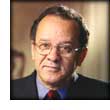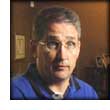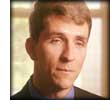|
 |  |  |  |  |  |  |
 |
 |





 | |  | |

Auto safety has long been one of the most controversial issues in American politics, centering on a fierce ideological battle between the advocates of government regulation and private litigation to protect consumers, on one side, and the proponents of free-market solutions and deregulation of industry on the other. Offering their perspectives here, in excerpts from FRONTLINE's interviews, are Jerry Curry and Joan Claybrook, former administrators of the National Highway Traffic Safety Administration (NHTSA); Brian O'Neill of the Insurance Institute of Highway Safety; plaintiff attorney Tab Turner; and Keith Bradsher, former Detroit bureau chief for The New York Times. |


 |
He is president of the Insurance Institute of Highway Safety. |  |  |
|

Your phrase is that auto safety is a "full contact sport." Tell me what you
mean by that.
 In Washington, D.C., highway safety has always been what I call a full contact
sport. It's not a nice consensus-building operation. There are many fights,
many disputes, especially when it centers around vehicle-related regulations or
defect recalls. The issues become very acrimonious. ... There's a lot of
fighting when it comes to vehicle safety.
In Washington, D.C., highway safety has always been what I call a full contact
sport. It's not a nice consensus-building operation. There are many fights,
many disputes, especially when it centers around vehicle-related regulations or
defect recalls. The issues become very acrimonious. ... There's a lot of
fighting when it comes to vehicle safety.

And is that conducive, or is that antithetical, ultimately, to vehicle
safety? Or is this inevitable?
I think that the issues that have become very controversial have not been good
for vehicle safety. They have delayed safety progress, because when there's
controversy, ultimately there are delays. ... We've had it on many regulatory
issues. ... They've been prolonged, and as they're being prolonged, the
problems are not being solved. ... | | |

In the mid-1980s, there was an effort to create some kind of rollover
standard. Congressman Tim Wirth (D-Colo.) petitioned the National Highway Traffic Safety Administration to do something. Why wasn't
anything done, and what difference might that have made?
First, the federal government has been trying to address vehicle stability
issues going back into the 1970s. They attempted to develop a vehicle stability
or handling test procedure that all vehicles would have been required to meet.
This was before there were many SUVs on the road; in fact there was just a
handful of SUVs on the road at the time. ...
Then there were issues related to the Wirth petition, which I believe at the
time should have been implemented. I think we should have introduced a minimum
stability standard based on vehicles' characteristics as proposed at the time,
but the government decided not to. Their conclusion was that it would eliminate
certain kinds of vehicles. Good, it would have eliminated certain kinds of
unstable vehicles or unstable designs. We now know that SUVs don't have to be
as unstable as some of the older designs were. The newer designs are more
stable. ...

Why was the Wirth petition defeated? Why didn't the government act?
At that time, we were in a period where the government was philosophically
opposed to regulation, so the agencies such as NHTSA were basically marking
time. It wasn't the career staff so much as the politicians of the time were
not going to regulate or we're going to have minimal regulations. ...

What happens to auto safety when the system becomes too antagonistic, as I
think we agree it has become?
When the system becomes totally adversarial, there is no possibility of a
dialogue between the various forces so it all gets resolved in the courts or
elsewhere on the basis of who's won the latest battle -- not necessarily who
has the best information or the best solution for safety. It's just who can
win that particular fight. ...

Is the adversarial system an argument for a stronger NHTSA, a stronger
presence of an "honest broker," as one congressman said? Are you satisfied
with the role that NHTSA is playing? Does it need to be more aggressive?
There's no question that NHTSA needs to be strengthened. There has been a
cutback in government across the board, and NHTSA's been a victim of that. I
believe that it is good for vehicle safety, it is good for the car companies to
have a very strong NHTSA. I think that is essential, and we haven't had that in
recent years. The funding has been declining.
We have a major problem on our hands. We have 40,000 deaths a year in motor
vehicle crashes, and we have an underfunded agency. There are institutes in
Washington doing research on dental problems that have bigger budgets than the
National Highway Traffic Safety Administration. That's a scandal. This is a
major health problem. It deserves the same kinds of resources we put into other
health problems.

| |

 |
A retired major general in the U.S. Army, he headed the National Highway
Traffic Safety Administration (NHTSA) from 1989 to 1992. |  |  |
|
Shouldn't there have been a standard [even if it was less than perfect] to
apply to SUVs, so that we could somehow measure the stability of these
vehicles, so that the public has some idea of which ones are less safe than
others?
 ... There are people now who are clamoring, saying -- in fact, there's a law
out right now which says NHTSA has something like two years to develop a
dynamic rollover standard. They've been trying to develop a dynamic rollover
standard for 25 years. ... We have not been able to find out a way to do this.
So do we develop some half-baked standard, like the airbag, which was too
early, and kill more people just because the advocates are out there screaming?
Or do we simply say, "Time out, folks. When we get it right, we will field it.
We're not going to play games with the American public just to make you happy
and to advance your agenda."
... There are people now who are clamoring, saying -- in fact, there's a law
out right now which says NHTSA has something like two years to develop a
dynamic rollover standard. They've been trying to develop a dynamic rollover
standard for 25 years. ... We have not been able to find out a way to do this.
So do we develop some half-baked standard, like the airbag, which was too
early, and kill more people just because the advocates are out there screaming?
Or do we simply say, "Time out, folks. When we get it right, we will field it.
We're not going to play games with the American public just to make you happy
and to advance your agenda."

Isn't forcing manufacturers, not to eliminate SUVs, but to build them lower
and wider, a partial solution both to the highway and the off-highway
problem?
The first thing is, if they did that, I would shoot them personally.
| | |
 If they did what?
If they built them lower and wider. I have an SUV because I live on a mountain.
I have rocks and I have tree stumps, and I go over them. And I don't want an
SUV that is lower and that is narrower or wider or however you want to put it.
I don't want that. I want one that's pretty much just like it is. I bought this
SUV for that reason, and the SUV was designed for that reason: to go off-road.
And I like to go off-road where I live, and I think people like me want that
kind of vehicle. Should I have the right to buy that vehicle? Absolutely.
Should the manufacturers then make that kind of vehicle? Yes. Is it more
dangerous than a vehicle that is lower and wider? Yes. I'll take the
tradeoff.

But 90 percent -- above 90 percent -- of the people who buy SUVs never go
off-road with them. And is it your contention that those 90 percent of the
people don't deserve protection from rollover, but that they ought to know,
just intuitively or commonsensibly, that these things are more dangerous, and
accept that risk?
My contention is that the American people are not stupid. They buy what they
want to buy. They know that vehicle is higher. And if [after] all of the TV
press over the last 20 years you don't now know that an SUV is not like a car,
something is wrong with you.
I believe in the American people. I think they have the right to buy SUVs, and
I believe that if they don't want them, they won't buy them. That's the way
supply and demand works. ...

Do you contend that people have a sufficient knowledge of the rollover
problem to protect themselves? Or should there be some kind of role for
regulation in this issue?
If I could figure out a way to make SUVs safe, there would be a regulation
today. Congressman Timothy Wirth tried that [in] 1986. ... He wrote NHTSA a
letter and he said, "Let's use this little measurement device that I've come up
with, a little formula..." He didn't come up with [it], actually, some
plaintiff attorneys came up with [it]; they were using it in court cases. And
he said, "Let's use this little formula, and then all cars that fall outside of
the formula, we'll declare them as unsafe." We can do that today, by the way,
with the SUVs.
Well, it meant that every pickup truck in America was unsafe. Of course, the
congressmen and senators from Nebraska and Kansas and Oklahoma, they didn't
think much about that idea. In fact, it eliminated just about every kind of car
that it was even close to a Jeep. That wouldn't work. Can we do it today? Sure,
we could do that today. Make sense? No. American people stand for it? You don't
believe that for a minute. ...

You say that a heightened CAFE [Corporate Average Fuel Economy] standard
would have forced the downsizing of the vehicle fleet, and as you dramatically
illustrated, when big cars hit small cars, the small cars wouldn't be able to
come through as well. But it's interesting because, in essence, by not
heightening CAFE, by not creating the rollover standard and everything, NHTSA
and the government have enabled manufacturers to build bigger and bigger
vehicles, bigger and bigger SUVs. And hasn't it been borne out that, because of
the increase in size of the vehicle fleet, there's more danger on the road for
smaller cars?
It's sort of almost the philosophical standpoint you come at this. If you think
the federal government has the right to dictate to the American people the size
of the car they should buy and use, then it makes sense to do this. But if you
believe, like I do, that the American government doesn't have that right to
dictate to the American people that you can only -- this is not the Soviet
Union -- you can only ride in that size car. I don't think that's right. I
don't think that's the American way. I don't think that's what should be
happening. ...

What is the role of the safety advocates and plaintiff attorneys? Have they
become in some way de facto regulators in our system?
The plaintiff lawyers and the safety advocates attempt to become the de facto
regulators. If they had their way, they would in fact be the regulators. And
they would regulate it in a way that they can litigate it in court and make an
awful lot of money out of it. That's what drives them -- the greed, the money
that's involved in the process.
The good news is that there have been some brakes on them -- maybe to a degree
through ineptness -- but the Congress has had some brakes on them. NHTSA has
resisted in some areas; not as much as it should have, by the way. This is, I
think, going to be a major problem for us in the future -- NHTSA's failures to
really resist some of the encroachment that is taking place.
So I think if you were to ask me, what should the role be of the plaintiff
lawyers? The answer is they should not have a role. They do not have a role in
safety. They have a role in the legal system. They have a role in trying to
redress grievances. They have a role there. But in terms of the safety system,
they don't have a role, and they should not be playing a role. ...

| |

 |
He is a product liability attorney who specializes in SUV rollover cases. |  |  |
|
As a trial lawyer, on the one hand, you've got a kind of public role as an
enforcer of safety, in a sense. On the other hand, you have to represent a
client who's been terribly injured in some cases and desperately in need of
money. Do those roles conflict at times?
 ... There's always a conflict between making sure that your client is protected
and that the client is given adequate information to be able to make a fully
informed decision about what to do in a lawsuit. On the other hand, we lawyers
sometimes can get so focused on beating the other side because of the
competition. I mean, this is literally war that is being waged between the
people that do what I do for victims, and for people that represent the auto
manufacturers. It's literally all-out war. And when the adrenaline is pumping
and the competition is going, if you're not careful, you can forget that this
case is about your client, your client's rights and your client's day in court.
...
... There's always a conflict between making sure that your client is protected
and that the client is given adequate information to be able to make a fully
informed decision about what to do in a lawsuit. On the other hand, we lawyers
sometimes can get so focused on beating the other side because of the
competition. I mean, this is literally war that is being waged between the
people that do what I do for victims, and for people that represent the auto
manufacturers. It's literally all-out war. And when the adrenaline is pumping
and the competition is going, if you're not careful, you can forget that this
case is about your client, your client's rights and your client's day in court.
...
| | |

What do lawyers think of NHTSA, and what were you thinking yourself when you
heard they might be noodling around in [the Ford-Firestone case]?
Oh, if we went back in time to before May 2000 and tried to get a perception of
what lawyers in general thought about the National Highway Traffic Safety
Administration opening investigations, it's really like water on the duck's
back. We just never really thought much about it one way or the other, because
historically, those investigations, like dominoes, had always clicked off one
after another against the consumer and in favor of the industry. And it was not
surprising. I mean, all these directors are political appointees, who, once
they leave the position at the National Highway Traffic Safety Administration,
went to work for the manufacturers. And they were testifying against my clients
in courtrooms across the country. ... I can list them for you, from Diane
Steed, to Jerry Curry, to William Boehly. The list is as long as my arm. These
people just going out the revolving door, regulating the industry one day, and
the very next day they're off in court testifying that the Suzuki Samurai is a
safe vehicle. ...

Do you think lawyers, safety advocate types and the news media are an
adequate substitute for regulation?
... Would it be nicer to have regulations in place that had bite and had
meaning and had technical common sense attached to them? Sure, it would be.
Would it be better to have a government regulation that was regulating this
industry without politics involved? Sure it would be. I just don't think that's
possible. I think that the kinds of things that we're talking about, that
pressure takes care of a lot of things that the government can't take care of.
And I will take 12 ordinary citizens over 12 politicians any day of the week in
making these decisions.

So it falls to you?
Yes. It falls to me, the people that do this for a living, and the Joan
Claybrooks of the world who will continue to fight for what they believe in, in
terms of trying to get regulations passed. ...

You've made a good living doing this -- is that fair to say?
Sure. I make an excellent living -- a lot better living than the guy who's
digging the ditches on the street out here.

And what do you say when the other side, or critics, say you're just a
shark; you're just exploiting the deep pockets of Ford Motor Company or GM or
Firestone?
My response is twofold. Number one, I guess the GMs and the Firestones and the
Fords of the world would have us believe that they ought to be able to choose
the lawyer who is going to represent the injured consumer. I'm not interested
in that kind of system. And secondly, if they're critical of the money we make,
just from a practical standpoint, I haven't made near as much money off of the
defective Explorer, for instance, as Ford has.

| |

 |
She is president of Public Citizen, a consumer advocacy organization founded by
Ralph Nader in 1971, and was head of the National Highway Traffic Safety
Administration (NHTSA) from 1977 to 1981. |  |  |
|
Does it bother you that private lawyers have more power to obtain relevant
safety information from a car company than the federal government seems to
have?
 Well, I don't think they have more power; I think it's how they use their
power. The federal government has plenty of power, but it hasn't used it. ...
The agency has tremendous authority to get information. It has been very
passive under the Reagan, Bush and even in the Clinton years, much more than it
ever should have been, and so it hasn't used its authority. ...
Well, I don't think they have more power; I think it's how they use their
power. The federal government has plenty of power, but it hasn't used it. ...
The agency has tremendous authority to get information. It has been very
passive under the Reagan, Bush and even in the Clinton years, much more than it
ever should have been, and so it hasn't used its authority. ...

You mentioned that in the early 1990s, but generally [since then] there's
been a very anti-regulatory environment, and there were a lot of issues on the
table that needed to be addressed. And the [Firestone] tire became a vehicle,
if you will, in real political terms, to get these guys to do the right thing
on Capitol Hill. Is that right? | | |

No question. ... The agency was very intimidated about its regulatory muscle.
And so this was a great opportunity to say the agency has been underfunded;
it's been underpowered; it hasn't had the incentive to do this job; it's been
picked on by members of Congress. You know, "Free NHTSA! Let it do its job!"...

There's a battle in Washington between the folks who want the "market" to do
everything and the folks who think there's a role for regulation, between the
pro-industry folks and the pro-consumer folks. And you guys have been playing
defense for a while, haven't you?
[Ford-Firestone] was a very important opportunity, because we had been playing
defense on regulatory issues. There'd been regulatory rollback bills being
pressed. Republican administrations under [Reagan] and Bush had done virtually
nothing on the regulatory side. There was a long unfinished agenda of things
that needed to be done. The industry was using all of its power through its
campaign contributions in other areas to stop regulatory activity. And they'd
been very successful.
So this was an opportunity to reverse the course and to say, "We need
regulation. Here is what's happened when you don't have regulation -- people
get killed. Your neighbors, your friends. And we need to have increased
standards. These standards are 30 years old; they've never been updated. The
law's not being enforced. The agency is passive; it's intimidated; it's
underfunded." Congress had to react. The spotlight was on them, and they had to
react. And they did. ...

Some people would call [your relationship with plaintiff lawyers] an unholy
alliance, because you have become the de facto regulatory enforcers in this
country. And there are people who think that that's unfortunate, because it
creates defensiveness in these companies, it creates secrecy in these
companies. They always have the threat of a lawsuit or the threat of a shrill
attack from a group like yours hanging over their heads, and it's not the best
way to operate. What's your response to that?
If the auto companies did voluntarily what we paid them to do voluntarily,
before the regulatory process takes effect or before there's a lawsuit filed,
then we wouldn't have to do our job. But the fact is that they don't. The
companies have known for years and years about these problems, and they have
never addressed them.
So there's only one possible thing to do, which is to hold them accountable.
And you hold them accountable by the media, by lawsuits, by regulatory
investigations, or by new safety standards. This has been going on now for 35
years. I've been working on this for 35 years. ...

Give me a sense of the Reagan administration.
The Reagan administration came into power to deregulate. And they took lists of
regulations to abolish from the industry the day they walked into the White
House. Vice President George Bush was put in charge of the regulatory task
force. And within four months of coming into office, [he] had published a list
of "Actions to Help Detroit." That's what it was called. It was regulations or
safety standards that they were going to abolish, and environmental regulations
as well. And they set about to do that. ... Then there were many pending
matters that they completely ignored and never acted on. ...

Help me understand, on the one hand, your philosophy, and on the other hand
the philosophy, say, of [your successor at NHTSA], Diane Steed, or any number
of people who represent that point of view. Is there a kind of philosophical
belief system that separates the two of you in the area of safety and
priorities? ...
I believe that the government has a role to play in protecting the public and
the public interest. And that means regulation for safety standards and
enforcing the law against a corporation. Diane Steed, I think, comes out of a
money system, where she believes that business doesn't need to be regulated.
And she has done everything that she can to avoid regulation for business. I'm
not sure I view it as philosophical. I think it's more based on the issue of
money. I don't have any moneyed interest that guides my thinking, and she
does.

Has the SUV been given a free ride by the regulators?
... It's really a lucky vehicle, because it developed and started in the
marketplace during the Reagan years, when there was not going to be any
regulation of it. The Wirth petition was turned down [in 1986]; fuel economy
standards were not being upgraded. By the time the Clinton administration came
in 1993, it was a very dominant part of that vehicle marketplace. And even
then, the Clinton administration was not about to make an enemy of the auto
industry. ...
So this vehicle has just lucked out from the politics, and also it's been very
shrewdly protected by the auto industry in its lobbying of Capitol Hill and its
avoidance of fuel economy standards, [and in its] cover-up, as in the Firestone
case with the Ford Explorer, of the dangers of this vehicle and the failure of
the agency to even test it for rollover.

| |

 |
Former Detroit bureau chief for The New York Times, he won the
George Polk Award in 1997 for his reporting on SUVs and light trucks. |  |  |
|
Does it fall on the federal government to protect consumers in a case like
SUV rollover, where the market isn't demanding safety and there is no real
pressure on the automakers to do anything? Is this a classic case for
regulation?
 Many have argued that it is a classic case for regulation when consumers cannot
readily perceive the safety drawbacks to a faddish new class of vehicles. And
yet the regulators weren't really doing that much. Part of it was that there
was political pressure -- not just from the automakers -- but also from groups
financed by the automakers, and even the public. The fact was that the public
really wanted these vehicles, and the politicians didn't want to get in their
way. ...
Many have argued that it is a classic case for regulation when consumers cannot
readily perceive the safety drawbacks to a faddish new class of vehicles. And
yet the regulators weren't really doing that much. Part of it was that there
was political pressure -- not just from the automakers -- but also from groups
financed by the automakers, and even the public. The fact was that the public
really wanted these vehicles, and the politicians didn't want to get in their
way. ...

NHTSA was one thing under the Carter administration, and then it became
something else. What was the before and after?
During the Carter administration, under Joan Claybrook, NHTSA was a very
aggressive investigator. They did things that drove the automakers nuts, like,
for example, releasing television footage of the Ford Pinto bursting into
flames. That infuriated the automakers, who were delighted when President
Reagan won election. The automakers contended that the regulatory burden on
them had become excessive. NHTSA was gutted in terms of its budget. Its staff
was cut very, very deeply, and it has never really recovered from that. Its
funding remains a third below where it was in 1980 after adjusting for
inflation. | | |

And you had a different kind of administrator?
In the Reagan and Bush administrations, you had a succession of administrators
who were much more cautious about criticizing the auto industry, and who tended
to go to work for the auto industry after they left government.

What do you make of that piece of the revolving door?
We have had a pattern for the last 20 years of regulators going to work for the
automakers after they leave the National Highway Traffic Safety Administration.
And that has created incentives for the regulators to be less harsh to the
people who are later going to employ them. It has also made the trial lawyers
much more reluctant to tell NHTSA about problems, because when you get a safety
investigation and then the regulators close it, the regulators then also leave
government and then begin testifying for the automakers that there was not a
problem; they investigated, and they didn't find a problem. ...

What role are the plaintiff lawyers playing in the auto safety system today?
They characterize themselves as the last line of defense, or the only
bulwark.
Trial lawyers play a sometimes-contradictory role in automotive safety now. On
the one hand, they like to portray themselves as the last line of defense
protecting consumers. On the other hand, their obligation is not to the general
public -- their obligation is to their client. But very often, their client's
interests are different from those of the general public. ...
The trial lawyers who sue automakers are not the Erin Brockoviches of this
world. These are very wealthy people who fly from meeting to meeting in their
private jets. They have much more lavish budgets even often than the
automakers' own lawyers. They can make $10 million if they get a $30 million
settlement. In the Firestone cases, they have made huge fortunes. ...

home · introduction · unsafe on any tire? · before you buy... · interviews · nixon & detroit
discussion · links & readings · video excerpt
producer's chat · tapes & transcripts · press reaction · credits · privacy policy
FRONTLINE · wgbh · pbs online
photo copyright © richard hamilton smith/corbis
web site copyright WGBH educational foundation
|
 |
|